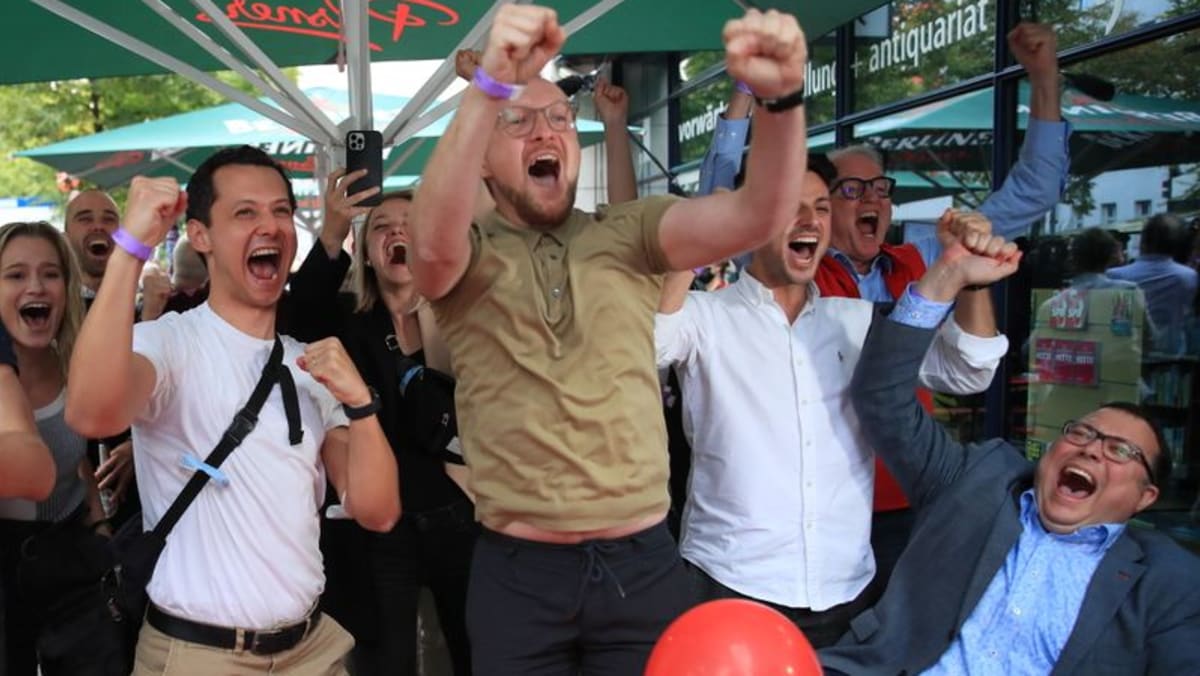
BERLIN: Germany's Social Democrats narrowly won Sunday's (Sep 26) national election, projected results showed, and claimed a "clear mandate" to lead a government for the first time since 2005 and to end 16 years of conservative-led rule under Angela Merkel.
The centre-left Social Democrats (SPD) were on track for 26 per cent of the vote, ahead of 24.5 per cent for Merkel's CDU/CSU conservative bloc, projections for broadcaster ZDF showed, but both groups believed they could lead the next government.
With neither major bloc commanding a majority, and both reluctant to repeat their awkward "grand coalition" of the past four years, the most likely outcome is a three-way alliance led by either the Social Democrats or Merkel's conservatives.
Agreeing a new coalition could take months, and will likely involve the smaller Greens and liberal Free Democrats (FDP).
"We are ahead in all the surveys now," the Social Democrats' chancellor candidate, Olaf Scholz, said in a round table discussion with other candidates after the vote.
"It is an encouraging message and a clear mandate to make sure that we get a good, pragmatic government for Germany," he added after earlier addressing jubilant SPD supporters.
The SPD's rise heralds a swing left for Germany and marks a remarkable comeback for the party, which has recovered some 10 points in support in just three months to improve on its 20.5 per cent result in the 2017 national election.
Scholz, 63, would become the fourth post-war SPD chancellor after Willy Brandt, Helmut Schmidt and Gerhard Schroeder. Finance minister in Merkel's cabinet, he is a former mayor of Hamburg.
Scholz's conservative rival Armin Laschet, signalled his bloc was not ready yet to concede, though his supporters were subdued.
"It hasn't always been the first-placed party that provided the chancellor," Laschet, 60, told the round table. "I want a government where every partner is involved, where everyone is visible - not one where only the chancellor gets to shine," he said in an early attempt to woo smaller parties.
Schmidt ruled in the late 1970s and early 1980s in coalition with the FDP even though his Social Democrats had fewer parliamentary seats than the conservative bloc.
COALITION FOR CHRISTMAS?
Attention will now shift to informal discussions followed by more formal coalition negotiations, which could take months, leaving Merkel in charge in a caretaker role.
Scholz and Laschet both said they would aim to strike a coalition deal before Christmas.
https://news.google.com/__i/rss/rd/articles/CBMib2h0dHBzOi8vd3d3LmNoYW5uZWxuZXdzYXNpYS5jb20vd29ybGQvZ2VybWFuLXNwZC1lZGdlcy1haGVhZC1jb25zZXJ2YXRpdmVzLXZvdGUtZGVjaWRlLW1lcmtlbC1zdWNjZXNzb3ItMjIwMjQzNtIBAA?oc=5
2021-09-26 18:30:00Z
52781886475259
Tidak ada komentar:
Posting Komentar